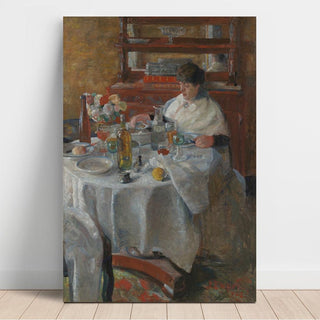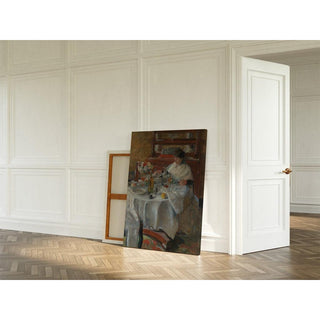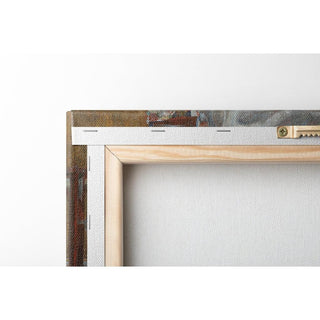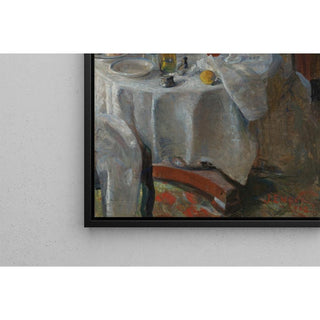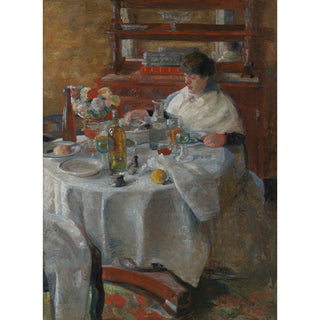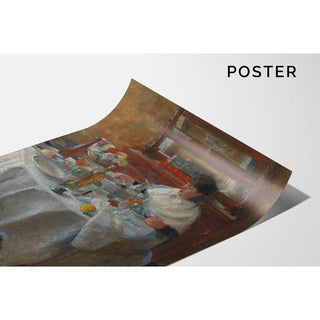The Oyster Eater - James Ensor | Art print Painting Wall decoration copy

The oyster eaters - James Ensor, also entitled The Oyster Eater, is a masterful work produced in 1882 by the Belgian artist James Ensor. This emblematic piece is part of the artistic movement which saw the emergence of new pictorial techniques, carried by a quest for innovation. The work is distinguished by its ability to capture deep emotions through vibrant colors and daring shapes.
In The Oyster Eater, Ensor portrays a woman to taste oysters, a scene that evokes both sensuality and pleasure. The artist, known for his mind that is both satirical and introspective, uses this representation to comment on society of his time. When it was released, the work shocked the public by its audacity and its modernity, causing mixed reactions which testify to the power of its artistic expression.
Technically, The Oyster Eater reveals the artist's innovation through an original space construction, giving the whole great sweetness. His subtle palette, where hot shades and delicate shadows mix, creates an intriguing and captivating atmosphere. The artist skillfully plays with light and texture, transforming a simple tasting scene into a complex exploration of humanity and his desires.
Have a Art print From this work allows you to appreciate the emotion transmitted by James Ensor while integrating a significant piece in your interior decoration. Whether in your living room, office or exhibition hall, this work enriches your living space with an artistic depth that encourages reflection and inspiration. By adding this magnificent Art print In your collection, you will celebrate art on a daily basis while creating a warm and welcoming atmosphere.
The eaters of oysters - James Ensor continues to influence contemporary artists and inspire art lovers around the world. By investing in this Art print, You participate in the preservation of the cultural and artistic heritage of our time. Let this emblematic work transform your space while reminding you of the beauty and complexity of life itself.

The oyster eaters - James Ensor, also entitled The Oyster Eater, is a masterful work produced in 1882 by the Belgian artist James Ensor. This emblematic piece is part of the artistic movement which saw the emergence of new pictorial techniques, carried by a quest for innovation. The work is distinguished by its ability to capture deep emotions through vibrant colors and daring shapes.
In The Oyster Eater, Ensor portrays a woman to taste oysters, a scene that evokes both sensuality and pleasure. The artist, known for his mind that is both satirical and introspective, uses this representation to comment on society of his time. When it was released, the work shocked the public by its audacity and its modernity, causing mixed reactions which testify to the power of its artistic expression.
Technically, The Oyster Eater reveals the artist's innovation through an original space construction, giving the whole great sweetness. His subtle palette, where hot shades and delicate shadows mix, creates an intriguing and captivating atmosphere. The artist skillfully plays with light and texture, transforming a simple tasting scene into a complex exploration of humanity and his desires.
Have a Art print From this work allows you to appreciate the emotion transmitted by James Ensor while integrating a significant piece in your interior decoration. Whether in your living room, office or exhibition hall, this work enriches your living space with an artistic depth that encourages reflection and inspiration. By adding this magnificent Art print In your collection, you will celebrate art on a daily basis while creating a warm and welcoming atmosphere.
The eaters of oysters - James Ensor continues to influence contemporary artists and inspire art lovers around the world. By investing in this Art print, You participate in the preservation of the cultural and artistic heritage of our time. Let this emblematic work transform your space while reminding you of the beauty and complexity of life itself.

